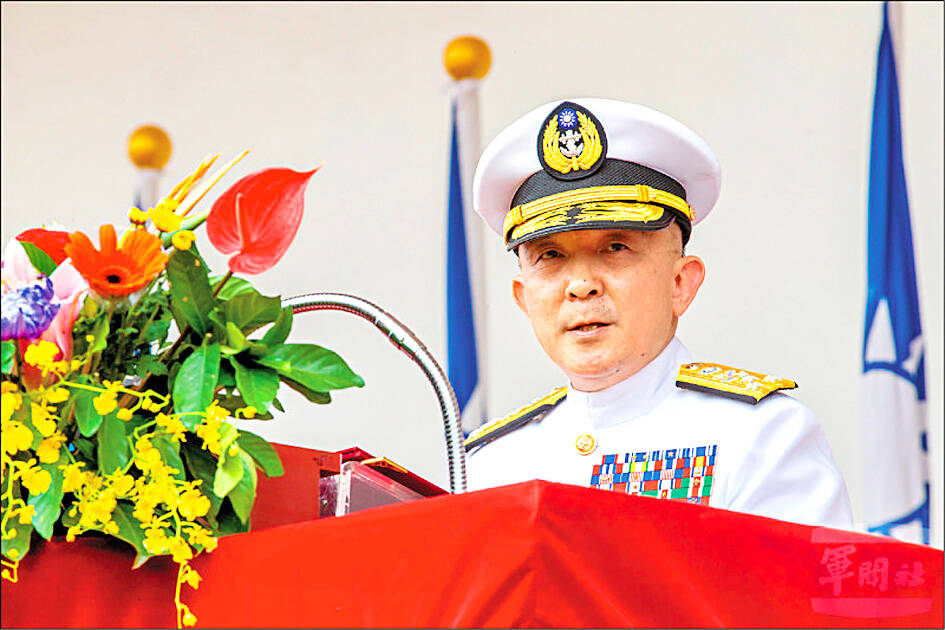China’s authoritarian expansionism threatens not only Taiwan, but the rules-based international order, the navy said yesterday, after its top commander said in an interview that the Chinese People’s Liberation Army (PLA) could blockade the nation at will.
The object of Beijing’s expansionist activities is not limited to Taiwan and its use of pressure is not confined to specific political groups or people, the navy said in a statement.
China utilizes a mixture of cognitive warfare and “gray zone” military activities to pressure Taiwan, the navy said, adding that PLA sea and air forces are compressing the nation’s defensive depth.

Navy Commander Admiral Tang Hua is pictured in an undated photograph.
Photo courtesy of the Military News Agency
The navy continues to counter Chinese actions by using its forces flexibly and integrating reconnaissance assets to ensure constant surveillance and quick reactions, it said.
The military closely watches the development of new tactics by the Chinese and takes prompt countermeasures to defend the nation’s sovereign waters, it said.
Navy Commander Admiral Tang Hua (唐華) on Thursday said in an interview with The Economist that the PLA is enacting an “anaconda strategy” to subdue Taiwan and that the nation’s armed forces are being stretched thin.
The Chinese military is “slowly, but surely” increasing its presence around Taiwan proper, he was quoted by the magazine as saying.
“They are ready to blockade Taiwan at any time they want,” he said.
PLA air incursions across the Taiwan Strait’s median line surged five times from 36 in January to 193 last month, and Chinese ships operating near Taiwanese waters have doubled from 142 to 282 during the same period, he said.
Chinese ships have moved closer to Taiwan and sail along the nation’s contiguous zone, or 24 nautical miles (44km) from shore, patrolling for days at a time, Tang said.
Citing Taiwanese analysts Ma Cheng-kun (馬振坤) and Tristan Tan, The Economist said the Taiwanese navy is deploying 25 percent to 50 percent of its combat strength to match PLA patrols.
“They give you extreme pressure, pressure, pressure. They’re trying to exhaust you,” Tang said, adding that a government audit found that more than half of Taiwanese principal combatants have fallen behind schedule on maintenance.
Most Taiwanese are unaware of PLA patrols’ proximity and regularity, as government updates on Chinese military activities do not identify warship types, their designation or the duration of their presence, Tang said.
The government could be worried that disclosure could harm Taiwanese morale or the economy, he was paraphrased as saying.
The navy is focused on avoiding confrontation as the PLA inches closer to the nation, because Beijing’s goal is to “force Taiwan to make mistakes,” Tang said, adding that mishaps could serve as “excuses” for launching a blockade.
The military this year issued new rules of engagement that legally and morally define the justifiable use of force, he said.
“We restrain our guys not to provoke or escalate,” he added.
The PLA has 10 times as many destroyers as Taiwan and twice as many frigates, The Economist said.
Source: Taipei Times - 2024/10/05




















